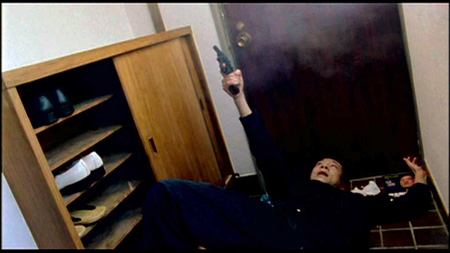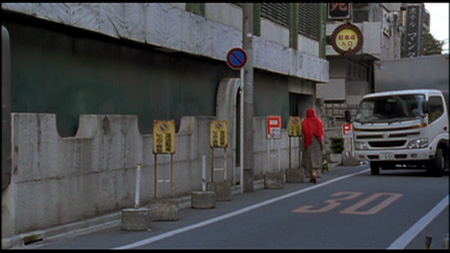
 BUY IT AT AMAZON: CLICK HERE
BUY IT AT AMAZON: CLICK HERE
STUDIO: AnimEigo
MSRP: $24.98
RATED: NR
RUNNING TIME: 131 Minutes
SPECIAL FEATURES:
• Making-of featurette
• Premiere Special
• Press release interviews
• Image gallery and trailers
The Pitch
A Japanese gangland tale done with realism as the core
value. That is: no glamour. No style. No fun.
The Humans
Director: Takashi Miike
Actors: Goro Kishitani; Narimi Arimori; Ryousuke Miki; Shingo Yamashiro; Tetsuo Tamba
Writer: Shigenori Takechi
The Nutshell
Dishwasher Rikuo Ishimatsu unwittingly saves the life of
a Yakuza boss by smashing an ashtray into a gunman’s face. The action instantly
ingratiates him to the boss who gives Ishimatsu a ranking position in the
family gang. Ishimatsu proves to be both brutal and unstable and lands in jail.
After his release, a simple misunderstanding gets his panties in a wad towards
his former ‘family’ and he begins to lash out severely. Hunted and wasted on
smack, his life nosedives.
The Lowdown
Let’s ignore that this is ostensibly a
remake of Kinji Fukasaku’s 1975 flick Graveyard of Honor.
Granted, like the original, this is a downbeat gangland tale that attempts to strip away the sensationalism typical to the average genre entry. Miike and screenwriter Shigenori Takechi went back to the original novel and made the story even more spare than Fukasaku’s version. Key to their approach is impassive actor Goro Kishitani, who makes a startlingly bizarre and frightening mobster. He doesn’t save the movie, though, which collapses under the weight of ambition well before the credits roll.

Ceiling cat…fucker…see what happens when you watch me…
The spare plot unfurls with severe economy. At first, it’s like Miike had to buy his story beats with ration coupons. After a brief flash forward to emphasize the tragic nature of the piece (if the inevitable self-destruction of a parasitic sociopath can be called tragic, but I’m going to refrain from humanist speculation here) we’re rapidly flashed with sequences. Ishimatsu saves a Yakuza boss; other underlings wince and grimace as he’s inducted into the family; flashy and streetwise, Ishimatsu struts and enforces family policies.
Then he takes two more hours to tell eighty minutes worth of story. Ishimatsu’s actual slide into hell is blotted with long scenes of former allies bemoaning his choices and heoin-laced interludes with the girl Ishimatsu finger-rapes, then keeps as a common-law wife. Those moments are necessary, but lingering upon them is not.

Dig deeper, ladies. I stole more than Chow Yun Fat’s style.
Miike never spares much thought for atmosphere; his films have in common one of two basic tones: a faded but slightly exaggerated faux naturalism, or a more heightened air of the fantastic. Here it’s the former, with a touch of imported Eastwood as an appealingly understated jazz score sets what passes for mood.
In Graveyard the realism is exaggerated towards the utterly nihilistic. Watching the film is like seeing a time-lapse loop of decay; the descent of Ishimatsu from arroagent servant to rampant antagonist is so inexorable that it can’t be called story. It’s more like divine intervention, the manipulating hand being Miike’s.

Japan’s new rage: LARPing Nicolas Roeg movies.
Despite Goro Kishitani being more suited than anyone I can imagine for the central role, so much so that he makes the film’s most uprooted moments seem almost natural, there’s no escaping the sense that Miike is looming over this production from moment to moment. The film isn’t allowed to really portray Ishimatsu’s breakdown, which begins when he misinterprets the Yakuza boss’s absence one day.
The overbearing directorial presence makes the film a total slog. It is almost uniformly unchanging in presence and feel; I felt like Miike was trying to punish me for having enjoyed any previous gangster movie laden with style and, for lack of a better word, melody.

Miike’s Lava Soap commercial never saw the light of day..
But this isn’t a gangster version of Funny Games. Haneke loads that movie up with commentary but keeps such a snake-like sense of humor that you can’t help but swallow it whole. Miike smothers the life right out of this story, all while hoping that his approach is going to reveal something to us about people and their volatility. All I learned was a new method for getting to sleep.
The Package
As always seems to be the case with AnimEigo, the
picture, sound and subtitle quality here are top-notch. The shot on video
footage has been made to look as clean and detailed as it’s ever going to get,
and there are multiple subtitle options with different colors, where a
secondary color is used to indicate overlapping dialogue. I would like an
option to turn off the subtitled notes, which intrude opon the film without
adding much information. (For example, one explains that prison inmates call
guards ‘boss’.) These notes should be in an inlay, or optional subtitle track.
But they’re infrequent, so it’s not a big problem.
But there’s no reason this should be a double-disc set. Extras like press release interviews and a special on the premiere are useless, and the ‘making of’ featurette is simply a voyeur’s eye into how things looked on set. It’s interesting for a moment, but hardly warrants a disc of it’s own. Much better if AnimEigo had spent money to assemble a commentary track discussing the relationship of this movie to the original, as they’re so loudly trumpeting the ‘classic remade!’ angle.
4.8 out of 10